Breastfeeding and feeding
To Assess and Celebrate
Was it easy to observe the baby’s growth in the weight/age curve?
Is there any doubt that you would like to share with the others?
Is there any message, prayer or biblical quotation that celebrates this occasion?
To See - The baby from six to eight months
1. How do the families in your community use to feed the babies of this age?
2. In your opinion, what should a baby of this age eat?
3. What are the most common diseases in this age? What do the families do when the babies get sick?

Foto:
Until six months, the mother’s milk is everything the baby needs to be nourished. After this age it is necessary to breastfeed and also to give the baby other baby food. Little by little the baby learns to try new tastes, temperatures and ways of preparation; tender, hard, thin or thick. This contributes to his/her development.
To give the baby new food will require attention, care and patience of the mother or whom looks after the baby. In the beginning the babies need more pasty and tender food, for they cannot chew yet.
The baby food has to be given in bigger amounts each time. It is important to check that the baby accepts it, eating with no haste, till he/she is full.
A great part of babies may refuse the food. It does not mean that he/she did not like it; he/she is refusing something he/she does not know. Another time, he/she may accept this same food that he/she refused before. It is necessary to offer him/her again but without forcing the baby to eat.
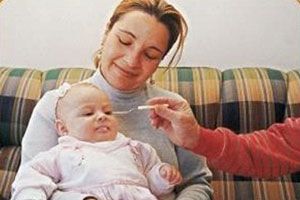
Foto:
The first food to be offered is fruit and baby food.
Fruit is important because it is a source of vitamins, they can be served mashed or scraped with a spoon. Always prefer the regional fruit and of the season; they are fresher and cheaper. Offering fruit is better than juices.
It is important to wash the fruit very well before giving it to the baby.
The baby food can be made of:
• Cereals, like rice, corn and wheat;
• Legumes, like beans, peas, chickpea and lentil;
• Meat or eggs: cattle meat, chicken, giblets and egg yoke;
• Roots, like manioc, potato, yam and sweet potato;
• Kitchen herbs, like kale, gherkin, arum, carrot and pumpkin;
• Seasonings like onion, parsley, green onion, garlic and a little salt. Apart from giving more taste to the food the seasonings are important sources of vitamins.

Foto:
Every new food, fruit or baby food should be given one by one and little by little. At first small quantities should be offered, one or two tea spoons per day. Increase the amount a little every day observing if the baby accepts it.
To get tender, the baby food should be well cooked. Use little water so that the food does not lose the vitamins and other nutrients like iron and calcium. Before serving it to the baby, the mother should knead the food well with a fork; never use the blender. Do not knead all the food mixed together for the child needs to know the taste of each food. In doing so the food becomes pasty, firm and colourful, stimulating the chew and the senses of the baby.
Start offering baby food at lunch time. The baby food served for dinner should only be offered when the baby is accepting well the food offered for lunch. Fruit can be offered as a snack, in the morning a well as in the afternoon.
The baby should be breastfed at least twice a day. The interval between the meals is different for each baby, but as an average it is from two to three hours.
The mother’s milk should be continued, at least, till the first two years old, even after the introduction of new food.
Other important food for the baby

The liver (cattle meat or chicken) should be offered as of the sixth month. It is a rich resource of iron and vitamin A. It should be pretty fresh, odourless and have a vivid colour. The chicken’s liver should be boiled and added to the baby food twice or three times per week. The cattle’s liver may be served fried or boiled, with potato puree, polenta etc. It is necessary to test which way of preparation is best accepted by the baby.
The egg yolk is a source of protein and vitamins A and D. It shall be offered boiled, starting with one quarter or half of it until the full egg yolk can be offered. If there is no sign of intolerance, such as diarrhea, vomit or allergy in the skin, two egg yolks can be offered per week, well kneaded and always mixed to another food (porridge, baby’s food).
The beans, after been boiled and lightly seasoned with (salt, onion, garlic, oil) it is kneaded with a fork. It can be served plain or with rice, polenta, baby’s food, flour.
The polenta or angu is a dish made of corn meal. Normally it is well accepted by the baby, mainly if accompanied by beans broth or meat gravy.
Offering food variety
In the seventh month the baby can already have his/her first “piece of meat”. It has to be a big, firm and preferably roasted piece. This piece has to be placed in the baby’s hand for him to soak it at ease, under the attentive eye of his/her care taker.
When the baby reaches the eight month he/she can start eating the family food, for he/she has already tried different food since he/she was six month. In this age, rice and beans and the meat stew with legumes still have to be kneaded, but less than the first baby food made.
A varied, colourful dish, besides calling attention to the baby allows him/her to get to know the taste of all the food served and provides the baby the several vitamins and nutrients he/she needs.
The fruit rich in C vitamin such as, orange, papaya, wild crapemyrtle, cashew, lemon, guava and mango served at the meals help the baby’s body to best absorb the iron from the food and prevent anemia. (See more details on page 31).
A good conversation with the mother about the food variety that there is in the region can help her to choose healthy food. It is important that the meal time is not transformed into blackmailing and a time of anguish. The baby should not be forced or spanked to eat.
Only food variety provides everything the baby needs and good eating habits.
It is important that the baby eats the amount he/she wishes, that he/she can explore the food with the hands, and that he/she tries to use the spoon and the glass if he/she wants. In this phase the baby likes to catch and touch everything and this will help him/her to better accept the new food.
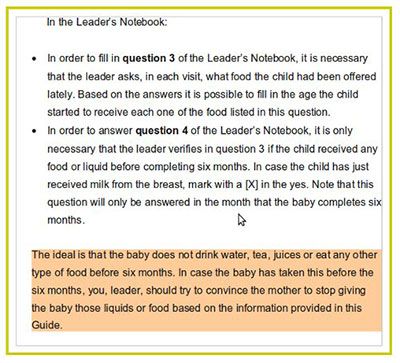
“Who, then, is the wise and trustworthy servant whom the master placed over his household to give them their food at the proper time? Blessed that servant if his master's arrival finds him doing exactly that.” Mat 24: 45-46
Anemia caused by the lack of iron
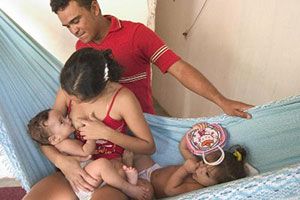
Foto:
Anemia, which is caused by the lack of iron, is the biggest nutritional problem in the world and reaches a big part of the babies. Iron is an essential nutrient for the life and acts mainly in the production of the blood red cells and in the transportation of the oxygen to all the cells of the body. The lack of iron diminishes the body resistance, leaving the baby more exposed to infections.
In the children, anemia caused by the lack of iron occurs by the low ingestion and because the body needs are big. Anemia occurs more frequently in babies being fed with powdered milk or after the sixth month, even in those who have been breastfed.
Attention: The babies who were prematurely born or were born with low weight need more attention because they have less reserve of iron.
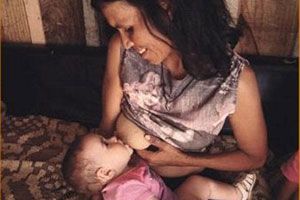
Foto:
Healthy babies who have been only breastfed until their six months, do not need any type of iron supplement until the introduction of other food.
When the child is fed with natural cow milk the risk of iron lack is higher, since in this type of milk the quantity of iron is also low and the body absorption is bad.
Leader, you have other information about health feeding on pages 29, 30, 31, 32 and 33 of this Guide.
The Health Department recommends that all the babies above six months receive supplements of iron, once a week, until they reach 18 months.
“For they will also ask the Lord to lead them to the right diagnosis and to do the healing. Claim in the presence of their Creator those who do not submit to the medical treatment.” Ecc 38: 14-15
How the baby can learn and grow
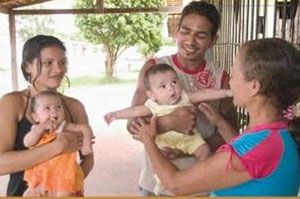
Foto:
Do the parents or does the care taker always provide opportunities for the baby to meet other people?
The care, love and attention of the mother and the father make the baby know them well and feel safe with them. Thus, with the help of the parents, he/she can learn to trust and to relate with other members of his/her family and with close friends. But it is necessary to go slowly with this, respecting the fear some babies have of the people who are not with him/her daily.
The baby likes to play of finding the face of the people or anything that is hidden right in front of him/her. Doing so, the baby can learn that the people and the things exist even if he/she is not seeing them. Thus, he learns to live with the absence of the mother, the father and of the other people important to him.
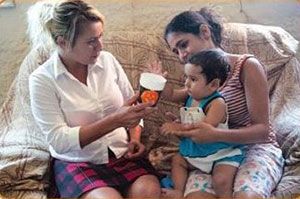
Foto:
Do the family members encourage the baby to play with objects?
The baby continues to enjoy having someone around him/her. For the baby to show interest for objects, he/she needs to be helped by people. This help can occur when the person offering objects to the baby, also shows her/his interest in the objects being offered. When the baby plays with them he/she demands less presence from the adult and also learns other things.
Thus, the baby each time even more curious, begins to move and catch everything that is close to him. He/she uses hands better each time – learns to catch small things between the thumb and the finger. He/she catches, bites, kneads, tears, plays, beats things experimenting and learning how they are.
Whenever the baby wishes to catch things which belong to the adult and which are dangerous, or wants to do what he/she can’t do, the parents should distract him/her or take him/her to another place. The baby still does not understand explanations and is still beginning to understand the meaning of the word no. If he/she insists on doing something, he/she should be hold firmly and distracted but not be beaten.
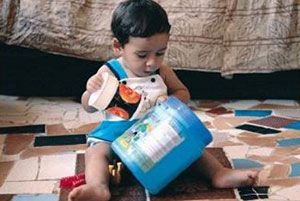
Foto:
Does the baby catch objects and play with them, beating, throwing and tearing them up?
Playing with objects, the baby learns that when he/she does something another thing happens. For example: when he/she beats with a spoon in the pan and the pan makes noise; when he/she pushes the button of the radio and the radio plays. Since he/she already knows to catch and to let, he/she likes to play catching things and throwing them on the floor to see how they fall. In doing so, he/she learns that some objects fall faster, others fall slower; some make noise, others do not. Sometimes, it requires patience to return to the baby what he/she has thrown.
Attention: The family needs to keep out and in safe place buttons, nails, pins and seeds because from this age on the baby already can catch small things and take them to the mouth, nose and ear. The baby with bad smell or nose secretion may have put something in these body parts. It is necessary to take the child to the health unit to be examined, because to take out these objects at home can make the situation worse.
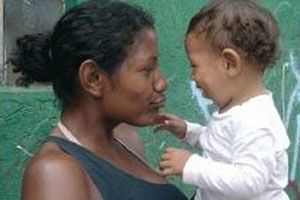
Foto:
Do the family members communicate with the baby in several manners, using sounds, gestures and words?
The baby begins to understand what they speak to him/her everyday, for example: “come here”, Say “bye-bye”. First he/she understands what the people speak, after that he/she learns how to speak.
He/she pays attention to the conversations between people and tries to imitate what they speak. It is good that the people speak to the baby and make sounds like: “ma ma “ “pa pa”, and expect him/her to repeat them. The family can play with the several sounds made by the baby such as: imitation of the sounds of the animals, cars, plane. In playing with the baby of applauding, saying god-bye, making funny faces, the parents are teaching him/her other ways of communicating.
When the people use several ways to communicate, this allows the baby to make bonds and also to communicate with them, even if he/she has any type of sense deficiency, for example, the hearing.
The baby needs to stay on the floor to try to move on his own.
The baby tries to catch everything that is put close to him: some babies will roll, others crawl or creep to fetch things. The parents have to make sure that all the places where the baby stays are safe because he/she still has not yet learnt that he/she cannot touch certain things or go to certain places.
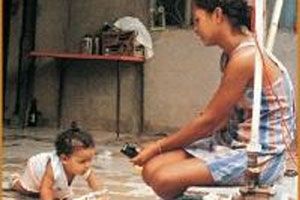
Foto:
Attention: Electric sockets, staircases and iron wires are dangerous because the baby can reach them. It is also necessary to keep the cleaning products and medications locked and in a place where the baby cannot touch them. If the baby swallows the product or medicine it is necessary to take him/her immediately to the health unit.
In this age, besides a good night sleep, the babies still need to sleep during the day. The parents need to find out how their baby likes to be quietened to fall asleep and try to do always the same thing the same way. This because repetition is one of the ways the baby learns and the routine also helps to make him/her feel secure.
“Let dawn bring news of your faithful love, for I place my trust in you; show me the road I must travel for you to relieve my heart” Psa 143: 8
Hygiene
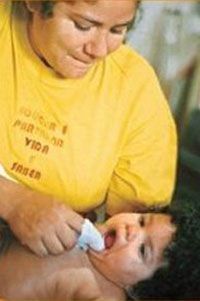
Foto:
The leaders should instruct the parents to always do the hygiene in the baby’s mouth, mainly after he/she starts eating food. It is not necessary to sweeten the baby’s food. Sugar is one of the main causes for tooth decay. Thus, the later the child receives sugar, lesser are the chances for the baby to have tooth decay.
When there is hygiene in the preparation of the food, we avoid diseases such as diarrhea. Therefore, it is necessary to wash the hands before preparing the food, be careful where to keep the food, avoid the contact with mosquitoes and always give improved, boiled or filtered water to the baby.
Since the baby needs to go to the floor to start moving on his/her own, he/she then gets much dirtier. Therefore, the daily bath has a great importance. It is also a good moment to talk to the baby and to touch him/her tenderly. Thus, apart from cleaning him/her, the bath quietens the baby.
Attention: The baby cannot be left alone in the bath tube/basin, not even for one minute. There is a big risk for him/her falling or drowning!.
Diarrhea and dehydration
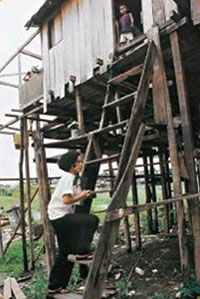
Foto:
Diarrhea is a soft, watery pooh and it comes more times than the usual amount. Diarrhea can be followed by vomits. Diarrhea as well as vomits is the way the body reacts to get rid of something that does it harm, such as poisons, spoiled or contaminated food. Therefore, you should not give medicines to stop diarrhea.
Medication should only be given upon medical prescription. Medication for diarrhea, in general, is only prescribed when the faeces of the child have blood, catarrh or mucus.
Diarrhea is a disease which can be caused by microbes that contaminate the water, food, containers, the hands of the people and the things they use to make the food. Mosquitoes, cockroach, rats, among others, bring microbes from the garbage to home.
Diarrhea spreads easily in places where basic sanitation is inefficient: when there is no clean water, the garbage is located in an improper place or there is no pit or latrine (toilet). When the baby starts eating other food, taking objects to the mouth, moving around on the floor, he/she has more chances to have diarrhea.
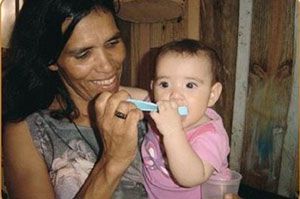
Foto:
When the baby has diarrhea it is common that his/her appetite reduces. However, it is advisable to keep on offering him/her the regular food. The seasonings and the oil should be kept. The rice baby food is a good food for children with diarrhea.
When the baby vomits or has diarrhea he/she has a loss of liquid and mineral salts in the body, and may become dehydrated. To avoid dehydration it is necessary to replace the quantity of what was lost. This can be done offering the child more liquids and also home serum or that coming in packages always in small amounts and several times during the day.
Attention: If the baby vomits the serum soon after he/she has drunk it, it means that the baby is not replacing what he/she has lost. Thus, it is necessary to take the baby to hospital as soon as possible.
Babies who are not breastfed have more serious diarrheas and die more easily because of diahrrea and pneumonia. The family needs to be more careful with the baby who is not being breastfed.
Home serum

The home serum is made with water, salt and sugar. In order to avoid mistakes with the amounts, the Child’s Pastoral uses a measuring spoon to prepare the home serum. It should be offered to prevent dehydration or as soon as the initial symptoms are shown. The home serum does not stop diahrrea, it just replaces the liquid lost in the faeces and vomits.
In order to prepare the home serum the following is necessary:
• a big glass (with 200 ml of water);
• a measuring spoon;
• salt and sugar.
After washing the hands very well, fill in a glass with clean, boiled or filtered water (200 ml). With the measuring spoon put 1 small and shallow measure of salt and 2 big and shallow measures of sugar, stirring them very well until salt and sugar are dissolved.

Besides teaching the parents to make the home serum, it is also necessary to serve the serum in small amounts to the child with diahrrea, watching for the recovery signs.
The serum should be served with a spoon or in the glass, and the amount made should be taken within 24 hours. If necessary, make the child take the serum for more days, the recipe should be prepared again every day.
Some children do not want to have serum. It is necessary to explain the mother to insist on it without forcing the child. She can talk to the child, explaining him/her that the serum will do him/her good and that he/she will recover sooner and that because she loves the child very much she does not like to see/him/her sick.
Besides taking the serum, the child should continue eating normally. When the child keeps on eating she recovers faster from diarrhea, has fewer complications and does not lose weight.

Vaccines

In the 6th month, the baby needs to take the third dose of vaccine against Hepatitis B, the third dose of vaccine against Polio and the third dose of TETRA vaccine.
Leader, if some baby is late in taking the vaccines, instruct the parents to take the baby to the health service unit to take the missing vaccines for that age.
Leader, the Health Department recommends the additional supplement of A Vitamin for children older than six months from the Northeast and some municipalities of the southeast of Brazil. Contact the local health service and get the information.

Leader, according to what has been seen make a list of:
• The ways to make better use of the iron sources, vitamins, etc in the baby food:
• The recipes that the children accept well:
Home Visit
It is important to:
Talk about breastfeeding; feeding.
Talk about the importance of preventing dehydration by means
of the home serum when the children have diarrhea.
Talk about the Signs of Danger, reminding the Love Bonds Cards about the Signs of Danger
“Children from two months to five years old,”
which have already been delivered to the family.
Answer the questions in the Leader’s Notebook.
Suggestion for this qualification stage
Visit the registered children, deliver the measuring spoon and instruct the mothers how to prepare the home serum. Fill in the food list on this page.



